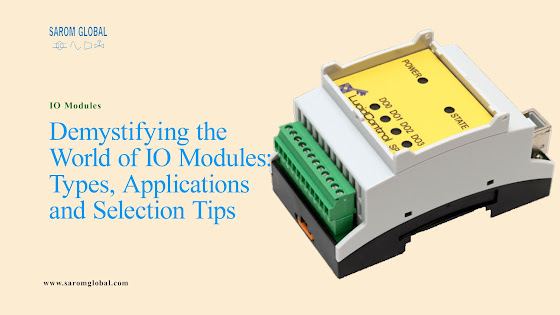Demystifying the World of IO Modules: Types, Applications, and Selection Tips
In the dynamic landscape of industrial engineering, IO modules are integral components, orchestrating seamless communication between devices in complex systems.
This exploration aims to demystify the complexities surrounding IO modules, shedding light on their types, and applications, and offering essential selection tips for optimising industrial solutions.
Unveiling the Basics of IO Modules
IO modules, short for Input/Output modules, form the nerve centre of industrial control systems. They facilitate the exchange of data between the control system and field devices. IO modules play a pivotal role in ensuring a harmonious flow of information within an industrial setup whether sensors provide input or actuators receive commands.
Types of IO Modules
1. Digital IO Modules:
- Applications: Widely used for binary signals, such as on/off switches.
- Selection Tip: Ideal for applications requiring simple input and output control.
2. Analog IO Modules:
- Applications: Suited for continuous signals, like temperature or pressure.
- Selection Tip: Essential for processes demanding precise control and measurement.
3. Communication IO Modules:
- Applications: Enable communication between different systems or devices.
- Selection Tip: Choose based on compatibility with existing communication protocols.
Applications Across Industries
IO modules find applications across diverse industries, from manufacturing to energy. In manufacturing, they streamline production processes, while in energy, they optimize the performance of complex systems. Their versatility extends to healthcare, transportation, and beyond, illustrating their indispensable role in modern industrial ecosystems.
Selection Tips for Optimal Performance
1. Compatibility:
- Ensure that the chosen IO modules align with the existing industrial control system and devices.
2. Scalability:
- Opt for modules that offer scalability, accommodating future expansion and technological advancements.
3. Reliability:
- Prioritise reliability to ensure continuous and stable operation in demanding industrial environments.
4. Customisation:
- Consider modules that allow customisation to meet specific industrial requirements.
What Makes SAROM GLOBAL A Trusted Choice For Quality IO Modules
Amidst the multitude of choices available, SAROM GLOBAL emerges as a shining example of excellence in the field of IO modules. Their commitment to providing project management, industrial engineering services, and state-of-the-art industrial solutions is evident in their meticulously designed IO modules. With a focus on seamless integration, scalability, and reliability, SAROM GLOBAL's IO modules stand as proof of their competence in optimising industrial processes.
Conclusion
As we unravel the complexities surrounding IO modules, it becomes evident that these components are the linchpin in fostering efficiency and precision in industrial settings. By understanding their types and applications and adhering to strategic selection tips, businesses can harness the full potential of IO modules to drive innovation and progress in the ever-evolving landscape of industrial engineering.




Comments
Post a Comment